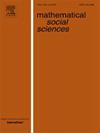Stable cartel configurations and product differentiation: The case of multiple cartels
IF 0.5
4区 经济学
Q4 ECONOMICS
引用次数: 0
Abstract
We develop a framework to analyse stable cartelisation when firms can form multiple cartels. This contrasts with the existing literature which generally assumes, without further justification, that at most one cartel may form. We define cartelisation to be stable in the multiple cartels framework if: (i) a firm in a cartel does not find it more profitable to leave the cartel and operate independently, (ii) a firm that operates independently does not find it more profitable to join an existing cartel, (iii) a firm in a cartel does not find it more profitable to join another existing cartel or form a new cartel with an independent firm, and (iv) two independent firms do not find it more profitable to form a new cartel. In the context of quantity competition in differentiated markets, we show that a single cartel is never stable whenever multiple cartels may be formed. We completely characterise the stable cartelisation structure — there is at most one firm that is not a part of any cartel while each of the remaining firms is part of a two-firm cartel. The implication for competition policy is that efforts towards the detection of cartels should also be directed at smaller cartels that may operate in less concentrated markets rather than only on large dominant cartels in concentrated markets.
稳定的卡特尔配置和产品差异化:多重卡特尔的案例
我们建立了一个分析稳定卡特尔化的框架,当企业可以形成多个卡特尔时,就可以分析稳定卡特尔化。这与现有文献形成了鲜明对比,现有文献通常假定最多只能形成一个卡特尔,而不做进一步论证。在多卡特尔框架下,我们将卡特尔化定义为稳定卡特尔化,条件是:(i) 卡特尔中的一家企业不认为脱离卡特尔独立经营更有利可图;(ii) 独立经营的一家企业不认为加入现有卡特尔更有利可图;(iii) 卡特尔中的一家企业不认为加入另一个现有卡特尔或与一家独立企业组成新卡特尔更有利可图;(iv) 两家独立企业不认为组成新卡特尔更有利可图。在差异化市场的数量竞争背景下,我们证明,只要可能形成多个卡特尔,单一卡特尔就永远不会稳定。我们完全描述了稳定卡特尔化结构的特征--最多有一家企业不属于任何卡特尔,而其余每家企业都属于双企业卡特尔。这对竞争政策的启示是,发现卡特尔的工作也应针对可能在集中度较低的市场中运作的较小卡特尔,而不是只针对集中市场中占支配地位的大型卡特尔。
本文章由计算机程序翻译,如有差异,请以英文原文为准。
求助全文
约1分钟内获得全文
求助全文
来源期刊

Mathematical Social Sciences
数学-数学跨学科应用
CiteScore
1.30
自引率
0.00%
发文量
55
审稿时长
59 days
期刊介绍:
The international, interdisciplinary journal Mathematical Social Sciences publishes original research articles, survey papers, short notes and book reviews. The journal emphasizes the unity of mathematical modelling in economics, psychology, political sciences, sociology and other social sciences.
Topics of particular interest include the fundamental aspects of choice, information, and preferences (decision science) and of interaction (game theory and economic theory), the measurement of utility, welfare and inequality, the formal theories of justice and implementation, voting rules, cooperative games, fair division, cost allocation, bargaining, matching, social networks, and evolutionary and other dynamics models.
Papers published by the journal are mathematically rigorous but no bounds, from above or from below, limits their technical level. All mathematical techniques may be used. The articles should be self-contained and readable by social scientists trained in mathematics.
 求助内容:
求助内容: 应助结果提醒方式:
应助结果提醒方式:


